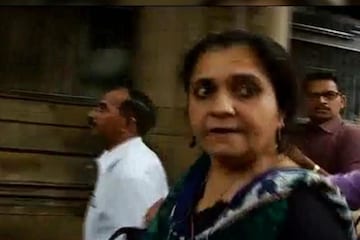Unmasking Teesta Setalvad: How She Created Self-Serving NGO Industry with Dubious Modi Operandi
- By : Anirban Ganguly
- Category : Articles

The distinction of cartelising NGOs, civil society and human rights activism in India must go to Teesta Setalvad and to her cohort and fake forums such as Communalism Combat, Sabrang and the Citizens for Justice and Peace (CJP). These organs were founded and funded with the sole intention of halting Narendra Modi in his tracks, first in Gujarat and later nationally. No other leader perhaps, in independent India’s political history, has had to face the kind of intense, sustained, many-sided, hydra-headed and intensely vicious campaign that Modi had to face since 2002.
In no other leader’s destruction and political annihilation had external elements as much interest and involvement as they had in that of Modi, in no other leader’s permanent political exile had the communists in India, the Congress’s first family and extreme Leftist intelligentsia invested so much as it had in that of Modi’s. Yet Modi withstood the onslaught, never once questioned, nor for a moment cast aspersion on the judiciary, never once winced when repeatedly questioned and did not throw around his political weight even though he had clearly emerged as one of the most successful Chief Ministers of a large and fairly important state.
Modi did not direct his party-men and women to indulge in mock-dharnas, assault law enforcers, nor did he put up rigmarole while appearing for questioning. While many facets of Modi have been examined, studied and written about, this aspect of his personality, a dogged adherence to the constitutional and judicial process, even in times of extreme adversity, can be a study apart. It is only the comprehensive lunatics who have accused Modi, over the years, of compromising the independence of constitutional institutions. To an impartial observer, his track record starkly points at the opposite. In fact, those who have yelled loudest are the ones who have really been complicit or instigators of institutional compromise in India in the past.
Perhaps a second trial, a second hauling to the docks must now begin and continue for the next two decades, of all those who resorted to deliberate and wilful subterfuge, resorted to chicanery, to repeated fausse declaration, attempt to cheat the judiciary, compromise elements within the law enforcing agencies, heap calumny on the legal process, all this with continued support and protection from the leading lights of the Congress and the communist parties. In fact, the CPI-M had organised a relief fund, money from which was allegedly used to pay witnesses. As many as 10 witnesses were reportedly paid Rs 1 lakh each by Teesta, using money from the CPI-M relief fund, months before the witnesses deposed in courts and five years after the clashes had taken place.
The chief coordinator of the CJP confessed that he had submitted the name of the beneficiaries to the CPI-M on instruction from Teesta Setalvad: “Setalavad identified the people and I merely followed her instruction and forwarded the list to the CPI-M.” From the CPI-M relief fund, witnesses were paid on priority anything between Rs 1 lakh and Rs 50,000, while the victims were only paid a pittance of Rs 5,000.
An opuscule we put together in 2014, The Truth About Teesta Setalvad, on the fraud that Teesta had committed had predicted her eventual doom. The brazenness with which she raised funds ostensibly to help the “victims” of the Gujarat riots and used those for purely and shockingly personal use, the manner in which she received protection from and access to the Congress first family and the communist web, both political and intellectual, indicated the active interest that the then establishment took in trying to corner Modi. Its members are protesting loudest today against Teesta being hauled up by the law because they realise she could eventually blurt out the whole story. Teesta Setalvad’s story of fraud is a long and intricate one, but a few elements would be in place in this narration.
During the general elections to constitute the 13th Lok Sabha in 1999, for instance, Teesta Setalvad’s magazine Communalism Combat came out with a “flurry of 18 ads” issued against the Sangh Parivar, especially targeting the RSS and BJP. When asked as to who funded her “ad campaign” since it is said to have cost about Rs 1.5 crore, Teesta answered with a nonchalance that it was the “Congress, CPI, CPM and about 10 prominent individuals” who had contributed this money. When asked whether this acceptance of money from political parties compromised her independence, Teesta replied in a cavalier manner: “We’re quite certain it will not… Our rationale for linking with the Congress/CPI/CPM is to politically isolate the BJP.
It’s a waste of time to speculate on whether we’ve compromised ideals by associating with the Congress.” Teesta obviously found such a speculation a waste of time, since she and the Congress and communists were natural allies in their mission to decimate Modi’s political career and trajectory.
That the entire operation was a planned, tutored and conjured one was evident when one of Teesta’s closest associates spilled the beans. What Teesta did with Zakia Jaffri, she did with others too. Rais Khan Pathan told the court that “when most of the victims had failed to give definite names of the accused persons”, they were “asked to give names based on their enmity with persons in their locality to fix them.” When Pathan, who had fallen out with Teesta, began deposing before courts, Teesta’s close aide-de-camp, former DG of Police of Gujarat, RB Sreekumar, then a member of the AAP, called up Pathan, asking him to patch up with Teesta and issued a veiled threat that if Pathan did not follow his advice he would have to “face the wrath of Muslim terrorists or radical groups”. Sreekumar’s link with radical outfits became evident when Pathan began receiving threat calls asking him to desist from speaking out the truth in court. This clearly indicates that not only Teesta, but the CPI-M and the Congress too were part of a web that had links to terror and radical outfits which were trying to determine the course of these trials.
Teesta Setalvad and her husband Javed Anand’s Sabrang Trust were also recipients of international largesse, especially from organisations which had axes to grind in Gujarat. In 2009, for instance, the Ford Foundation had paid Sabrang Trust a grant of $250,000 for its work in Gujarat. The Netherland-based, verbosely named, Humanistic Institute for Cooperation with Developing Countries (HIVOS) pumped “more than 13 lakh euros” in Gujarat and to Mumbai- and Delhi-based NGOs between 2008 and 2012. Teesta’s CJP, Congress national general secretary and leader from Gujarat Madhusudan Mistry’s NGO DISHA, and ANHAD run by the one of the ringleaders of the anti-Modi leftist cabal, Shabnam Hashmi, were recipients of this largesse.
The rider for utilising this money, as specified by HIVOS was for “propagating Democratic Rights & Freedom of expressions through dance, poetry and musical evenings in Gujarat”, an apparently innocuous democracy-oriented objective, with the deeper objective of dislodging Modi. This is the kind of subversive international NGO network that Sonia Gandhi and her Congress party had facilitated across the country. Open the floodgates for foreign NGOs to operate through their proxies and subvert India’s democracy and democratic institutions.
In early 2013, members of the Gulbarg Co-operative Society submitted a memorandum to the Police Commissioner complaining that Teesta had collected huge sums of money nationally and internationally in their name saying that she would get their houses reconstructed and/or develop the society into a museum and nothing was passed on to them. Investigation into CJP and Sabrang Trusts accounts revealed that Teesta and her family had gone on a shopping spree. Data revealed that substantial amounts were “spent towards shopping, entertainment, foreign goods purchased and other ancillary expenses of purely personal nature”.
Huge expenditure was made on such purchases as “branded shoes from Metro Shoes and Reebok shoes, monthly hair styling expenses from Shiva’s Hair Designers Bombay, Geetanjali Salon Delhi, Body Shop. Purchase clothes from Fabindia, Westside, United Color of Benetton in Rome… dining expenses at Hotel Taj and several upmarket restaurants such as Out of the Blue, Little Italy, Café Leopold, Rays Café & Pizzeria, music systems from BOSE Corporation, purchase of jewellery from Amrapali”. Purchases included watches, wines, movie tickets, regular grocery, while Kuwaiti Dinars, USD, Canadian Dollars, EUROs, Pound Sterling, Pakistani Rupees were used on various occasions to make these purchases. Teesta and her cabal had diverted, with impunity, monies meant for charity towards purely personal ends.
The Teesta Setalvad and CJP story has many chapters to it and cannot be fully narrated in a single column. While Teesta and her accomplices are now being caught up by the law, what about her political masters, what about those who were in power then and had facilitated, funded and fuelled the false campaign of calumny which they had hoped would consume Narendra Modi? Should not they too be exposed and be hauled onto the dock?

















